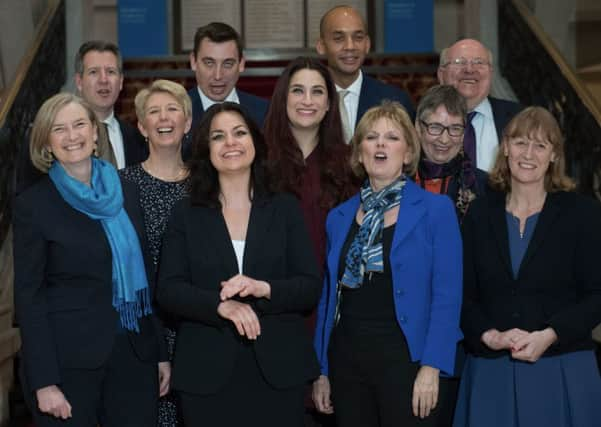Jayne Dowle: Rise of The Independents – a consensus begins with agreement between sexes


These breakaway MPs are united not by an agreed set of beliefs and philosophies, but a communal anti-Brexit front and shared anger at the wider intolerance and prejudice they have experienced in both the Labour and Conservative parties.
There is no doubt that the ‘boys’ club’ atmosphere and language of the House of Commons, together with the cases of sexual harassment and the abuse and disdain meted out towards many female MPs in the past few years, has been a trigger for rebellion.
Advertisement
Hide AdAdvertisement
Hide AdFormer Conservative member, Anna Soubry, hails this new grouping as “the modern face of politics” and it is this which we should concentrate on, rather than totting up the male/female ratio.
So far, there are been no indication that they are pulling together on any kind of ‘feminist’ ticket. This has disappointed some people. One commentator, Erin Mansell, of the Women’s Equality Party, argued that their policies (eventually, when we hear them) should naturally lean towards women’s rights because there were so many female Independents,
I can’t disagree with that, in principle. There are many issues concerning women directly which have been sidelined by this Government because Brexit has stolen so much political attention; amongst them sex trafficking, the decline in rape convictions and wider access to vital health screenings threatened by NHS cuts.
To give her credit, the Prime Minister is determined to push through tough new laws on domestic violence resulting in a string of prosecutions against abusive individuals who dominate their partners through ‘coercive control’.
Advertisement
Hide AdAdvertisement
Hide AdHowever, there are many societal and family matters which are no longer just ‘women’s issues’ – including domestic abuse – but also encompassing the cost of childcare, looking after elderly and vulnerable relatives, low pay, zero-hours contracts, flexible working and parental leave.
It is, therefore, time to move on the whole feminism in politics debate. I’d like to think that the Independents might become the poster boys and girls for this forward-thinking.
For too long now, well-meaning women have attempted to impose change and progress from without the system, inside of working from the inside outwards.
This is why the Women’s Equality Party failed to make an impact at the last election in 2017. All seven candidates lost their deposits.
Advertisement
Hide AdAdvertisement
Hide AdThis disappointment shouldn’t be seen as any reflection on the quality of those who stood; it’s the fear of the unknown from voters and the sense that nothing would change anyway.
Fast forward two years and we have a female Prime Minister who has broken through the ultimate ‘glass ceiling’. She has failed in many ways, not because she is a woman, but because the job in hand is almost impossible to execute.
The argument I remember from not so many years ago, namely we would never have a female Prime Minister again after Margaret Thatcher, is now redundant. With this aspiration taken out of the equation, what are we left with?
A bunch of cross-party centrist Independents in the House of Commons dominated by pragmatic women who want to pull together to make some kind of progress. I’m not playing into the gender stereotypes cliches myself here, but it’s not inconceivable to argue that, as women, their concerns will extend beyond the pointless point-scoring of what passes for Parliamentary debate.
Advertisement
Hide AdAdvertisement
Hide AdThey will see the bigger picture of a country at war with itself, they will have a deeper understanding of division and prejudice and they will want to roll their sleeves up and get on with the job.
And let’s remember that these were not women standing up on and waving a feminist flag, but presenting themselves on an entirely equal footing with their male colleagues. With this, all previous women-in-politics tropes have been over-rided.
For comparison purposes I’ll just remind you of those cringingly stage-managed photo ops of ‘Blair’s Babes’, the record number of female MPs returned to Parliament in Labour’s 1997 landslide General Election.
Whatever The Independent Group goes on to achieve in terms of forcing a second EU referendum, or the impact which their defection will have on their previous political parties and current leaders, we should remember that they have shown a pioneering spirit Emily Pankhurst would have been proud of. Here is the potential for consensus politics in its widest sense, and it starts with agreement between women and men.